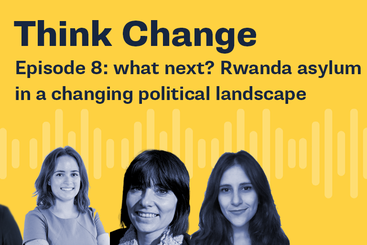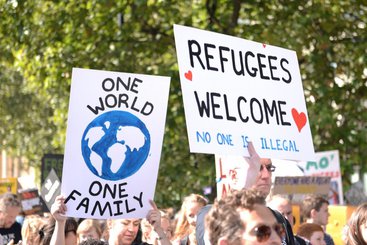The government of the United Kingdom (UK) agreed a controversial deal this April to transfer people seeking asylum to Rwanda. Following a last-minute intervention by the European Court of Human Rights, the first flight for Rwanda was cancelled minutes before take-off. Undeterred, Home Secretary Priti Patel has since said that preparations for the next flights ‘have already begun’. All the Conservative leadership candidates have given the Rwanda policy their full backing, too, so this policy is not going to be overturned anytime soon.
In some respects, the UK’s deal with Rwanda is not new. Since 2002, the European Union (EU) has proactively established multiple partnerships that outsource migration and border management to countries of origin and transit, such as Libya, Türkiye and Niger. But the UK–Rwanda deal is different. It is not just about reinforcing transit borders to deter migrants from arriving, nor is this just another example of the offshore processing of asylum seekers should they arrive in the UK. This deal represents the wholesale transfer of the UK’s asylum responsibility to another country. Once their claims are transferred, successful asylum seekers will only be eligible to stay as refugees in Rwanda – not in the UK where they first claimed asylum.
This emulates Australia’s extreme and punitive approach since 2012 of detaining asylum seekers who arrive without valid visas by boat, before forcibly transfering them to Nauru or Papua New Guinea for processing. A permanent ban on settlement in Australia was also introduced in 2013. The key difference is that Australia’s policy of forcibly returning boats (‘boat turnbacks’) means that few asylum seekers actually reach its shores to claim asylum. In the case of the UK, those being threatened with transferral to Rwanda have already arrived and claimed asylum. Given that the overwhelming majority of those who come to the UK to seek asylum are granted status, this wholesale transfer reflects a complete abdication of responsibility for asylum seekers in the UK.
As displacement around the world reaches unprecedented levels, international responsibility sharing is more important than ever. Following the New York Declaration for Refugees and Migrants, the UK has committed to sharing responsibility. Yet, it trails other European countries like Germany, Spain and Greece in the numbers of asylum seekers granted refugee status. By ‘exporting its responsibility to another country’, the UK’s new deal is seeking to further abscond from its international and moral obligations.
The deal represents a crisis of responsibility, rather than the crisis of migration by which it is commonly framed. It dilutes and undermines the UK’s international commitments. It sets a dangerous precedent for others looking to leverage migration for political ends. (Denmark is now reportedly considering a similar deal with Rwanda.) And it sends an abysmal message to countries in the Global South struggling to host much larger refugee populations.
Beyond these moral failings, the deal also comes with wider implications – human rights, legal, political, reputational and cost – which, when taken together, highlight not only the very real risks involved, but also the very slim prospects for success.
Human rights abuses and legal gaps
As part of a deal with Israel, 4,000 Eritrean and Sudanese asylum seekers were sent to Rwanda and Uganda between 2013 and 2018. Abandoned on arrival, their ambiguous legal status left them vulnerable to exploitation by local authorities and smugglers. Characterised by informality and secrecy, the deal subsequently collapsed in the face of a public backlash in Israel, as well as growing diplomatic tensions with Rwanda.
In light of this earlier deal, much has been made of Rwanda’s inability to ensure refugees’ rights, protection and safeguarding upon arrival from the UK. However, the real human rights issue is the UK’s abdication of its international refugee responsibilities within a system designed to limit access to legal representation. A memorandum between the UK and Rwanda makes this clear: once an individual has been transferred to Rwanda, the UK's obligations to those seeking asylum abruptly stop. This absolves the UK from any responsibility for subsequent human rights abuses against deported individuals.
Lessons learned from similar deals paint a grim picture for human rights. Australia’s offshore asylum centres in Nauru and Papua New Guinea are beset by allegations of violence and abuse. EU externalisation agreements have been similarly condemned. The EU–Niger deal has ultimately increased irregular migration, migrants’ vulnerability, corruption and instability.
A lack of accountability plays a key part in the failings of these schemes, and similar gaps are apparent in the Rwanda deal. As the memorandum signed between the two countries is not legally binding, Rwanda is under no obligation to comply. Key legal concerns are thus the potential for human rights violations and a lack of access to representation and fair procedure for those whose claims are to be considered in Rwanda.
It is also telling that the memorandum specifically sets out provision for the policy being thwarted by legal challenge and that the UK Prime Minister stated in his announcement that they ‘expect this will be challenged in the courts’. The more sceptical among us might view this as a policy designed to fail at the hands of human rights lawyers. The point isn’t for the policy to work, but to demonstrate Conservative resolve to tackling immigration and thereby firm up political support.
The politics of migration manipulation
Migration partnerships have been described as short-term, self-interested, paternalistic and neocolonial fixes that will not address immigration concerns in the long run. EU readmission agreements feature aid spending, visas, trade agreements and legal pathways as direct benefits in return for migration controls. Built on a one-sided Western agenda, these agreements can unravel when the pressures of hosting migrants outweigh the financial incentives. This has left the EU vulnerable to ‘migration manipulation’ by Türkiye and Belarus, which threatened to stop cooperating on migration without further concessions.
What is more, tensions and conflict can escalate when Western-centric migration deals upset delicate geopolitical balances. For example, in order to reach consensus with Morocco on border patrols in Ceuta and Melilla, Spain sided with Morocco’s claims to territory over Western Sahara. Breaking with decades-long neutrality, this policy shift is highly provocative for Algeria, which backs self-determination for Western Sahara.
Similar risks are present in the UK–Rwanda deal. In the context of long-standing rivalry and tension between Rwanda, Uganda and the Democratic Republic of Congo (DRC), some have raised concerns that Rwanda will leverage the deal to its political advantage by allowing asylum seekers to cross en masse into neighbouring DRC, thereby creating instability and destabilisation in the east of the country.
The reputational risks at home and abroad
The UK’s deal with Rwanda has been widely condemned. The UN High Commissioner for Refugees, Filippo Grandi, and the Archbishop of Canterbury, Justin Welby, have publicly denounced the deal as ‘all wrong’ and as posing ‘serious ethical questions’. Such comments are highly damaging to the UK’s reputation as a defender of democratic values and human rights, especially at a time when the UK is trying to boost its global credentials.
What is more, a wide array of studies suggests that the more restrictive elements of migration management policies do not reflect the values of significant segments of the British public. Polling from 2021 revealed that 46% of Britons hold positive views about the impact of immigration, with only 28% holding negative views. When given the choice between fairness and deterrence as the most important features of the asylum system, 65% of Britons chose fairness with only 27% choosing deterrence. When it comes to the deal itself, only 35% support it, 45% oppose it, 50% believe its unworkable and 52% believe it’s unlikely to deter channel crossings.
A way forward
So what next? A judicial review to consider the lawfulness of the policy will be held in September. But regardless of the outcome, one-sided and restrictive migration deals that outsource asylum responsibilities to lower income countries are never going to be the answer.
The UK needs to look instead to its own systems and overhaul a tired, outdated and chronically underfunded asylum regime. The backlog of cases continues to grow, forcing individuals into years of limbo and even destitution. The deal with Rwanda does not address the issues in the asylum system or provide practical solutions. Instead, it seeks to instigate fear in the most vulnerable, and shift accountability from one of the wealthiest nations, all at significant cost to the UK taxpayer. On top of the £120 million up-front payment to the Rwandan government, the UK will also foot the bill for an additional £12,000 per asylum seeker, forced removals (£15,000 per individual) and flights (£9,700 per individual), as well as the fees for any prior screenings and detention. This spiralling bill should, in the context of the cost-of-living crisis, be better spent elsewhere.
Canada has taken a different approach to the UK. In 2016, it ranked highest among the G7 major economies for its migration policies and resettles more refugees than any other country. While its track record on border management has been criticised, by proactively engaging on migration issues it has solidified its position as a world leader in migration diplomacy. It played a lead role in negotiating the 2018 Global Compact for Safe, Orderly and Regular Migration (GCM), and has become a GCM ‘champion’ (one of only two countries from the Global North to do so). Its ability to lobby and influence at the highest global levels stems from its ‘perceived moral and expert authority’ on migration.
The UK needs to reconsider its approach to responsibility sharing, and following a similar pathway to Canada might not be a bad place to start.





